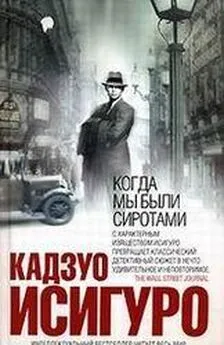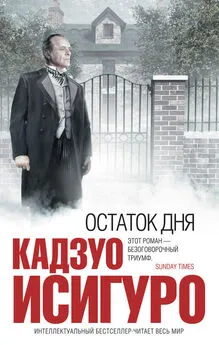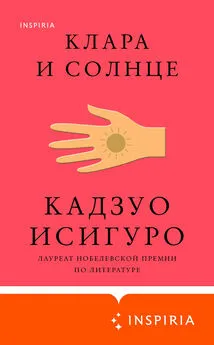Кадзуо Исигуро - Остаток дня / The Remains of the Day
- Название:Остаток дня / The Remains of the Day
- Автор:
- Жанр:
- Издательство:неизвестно
- Год:2020
- Город:Москва
- ISBN:978-5-04-112761-9
- Рейтинг:
- Избранное:Добавить в избранное
-
Отзывы:
-
Ваша оценка:
Кадзуо Исигуро - Остаток дня / The Remains of the Day краткое содержание
«Остаток дня» – дневник дворецкого, жизнь с точки зрения Бэрримора. В основе его стилистики лежит сдержанность, выявляющая себя в самой механике речи. Герой не считает возможным проявлять свои чувства, и на лингвистическом уровне эта своеобразная аскеза приводит к замечательным результатам – перед нами этакая оборотная сторона Достоевского с его неуправляемым потоком эмоций.
В 1989 году за «Остаток дня» Исигуро единогласно получил Букера (и это было, пожалуй, единственное решение Букеровского комитета за всю историю премии, ни у кого не вызвавшее протеста). Одноименная экранизация Джеймса Айвори с Энтони Хопкинсом в главной роли пользовалась большим успехом.
А Борис Акунин написал своего рода римейк «Остатка дня» – роман «Коронация».
В формате a4-pdf сохранен издательский макет книги.
Остаток дня / The Remains of the Day - читать онлайн бесплатно ознакомительный отрывок
Интервал:
Закладка:
Dr Meredith rose and said:
‘My condolences, Stevens. He suffered a severe stroke. If it’s any comfort to you, he wouldn’t have suffered much pain. There was nothing in the world you could have done to save him.’
‘Thank you, sir.’
‘I’ll be on my way now. You’ll see to arrangements?’
‘Yes, sir. However, if I may, there is a most distinguished gentleman downstairs in need of your attention.’
‘Urgent?’
‘He expressed a keen desire to see you, sir.’
I led Dr Meredith downstairs, showed him into the billiard room, then returned quickly to the smoking room where the atmosphere, if anything, had grown even more convivial.
Of course, it is not for me to suggest that I am worthy of ever being placed alongside the likes of the ‘great’ butlers of our generation, such as Mr Marshall or Mr Lane – though it should be said there are those who, perhaps out of misguided generosity, tend to do just this. Let me make clear that when I say the conference of 1923, and that night in particular, constituted a turning point in my professional development, I am speaking very much in terms of my own more humble standards. Even so, if you consider the pressures contingent on me that night, you may not think I delude myself unduly if I go so far as to suggest that I did perhaps display, in the face of everything, at least in some modest degree a ‘dignity’ worthy of someone like Mr Marshall – or come to that, my father. Indeed, why should I deny it? For all its sad associations, whenever I recall that evening today, I find I do so with a large sense of triumph.
Day two afternoon
It would seem there is a whole dimension to the question ‘what is a “great” butler?’ I have hitherto not properly considered. It is, I must say, a rather unsettling experience to realize this about a matter so close to my heart, particularly one I have given much thought to over the years. But it strikes me I may have been a little hasty before in dismissing certain aspects of the Hayes Society’s criteria for membership. I have no wish, let me make clear, to retract any of my ideas on ‘dignity’ and its crucial link with ‘greatness’. But I have been thinking a little more about that other pronouncement made by the Hayes Society – namely the admission that it was a prerequisite for membership of the Society that ‘an applicant be attached to a distinguished household.’ My feeling remains, no less than before, that this represents a piece of unthinking snobbery on the part of the Society. However, it occurs to me that perhaps what one takes objection to is, specifically, the outmoded understanding of what a ‘distinguished household’ is, rather than to the general principle being expressed. Indeed, now that I think further on the matter, I believe it may well be true to say it is a prerequisite of greatness that one ‘be attached to a distinguished household’ – so long as one takes ‘distinguished’ here to have a meaning deeper than that understood by the Hayes Society.
In fact, a comparison of how I might interpret ‘a distinguished household’ with what the Hayes Society understood by that term illuminates sharply, I believe, the fundamental difference between the values of our generation of butlers and those of the previous generation. When I say this, I am not merely drawing attention to the fact that our generation had a less snobbish attitude as regards which employers were landed gentry and which were ‘business.’ What I am trying to say – and I do not think this an unfair comment – is that we were a much more idealistic generation. Where our elders might have been concerned with whether or not an employer was titled, or otherwise from one of the ‘old’ families, we tended to concern ourselves much more with the moral status of an employer. I do not mean by this that we were preoccupied with our employers’ private behaviour. What I mean is that we were ambitious, in a way that would have been unusual a generation before, to serve gentlemen who were, so to speak, furthering the progress of humanity. It would have been seen as a far worthier calling, for instance, to serve a gentleman such as Mr George Ketteridge, who, however humble his beginnings, has made an undeniable contribution to the future well-being of the empire, than any gentleman however aristocratic his origin, who idled away his time in clubs or on golf courses.
In practice, of course, many gentlemen from the noblest families have tended to devote themselves to alleviating the great problems of the day, and so, at a glance, it may have appeared that the ambitions of our generation differed little from those of our predecessors. But I can vouch there was a crucial distinction in attitude, reflected not only in the sorts of things you would hear fellow professionals express to each other, but in the way many of the most able persons of our generation chose to leave one position for another. Such decisions were no longer a matter simply of wages, the size of staff at one’s disposal or the splendour of a family name; for our generation, I think it fair to say, professional prestige lay most significantly in the moral worth of one’s employer.
I believe I can best highlight the difference between the generations by expressing myself figuratively. Butlers of my father’s generation, I would say, tended to see the world in terms of a ladder – the houses of royalty, dukes and the lords from the oldest families placed at the top, those of ‘new money’ lower down and so on, until one reached a point below which the hierarchy was determined simply by wealth – or the lack of it. Any butler with ambition simply did his best to climb as high up this ladder as possible, and by and large, the higher he went, the greater was his professional prestige. Such are, of course, precisely the values embodied in the Hayes Society’s idea of a ‘distinguished household’, and the fact that it was confidently making such pronouncements as late as 1929 shows clearly why the demise of that society was inevitable, if not long overdue. For by that time, such thinking was quite out of step with that of the finest men emerging to the forefront of our profession. For our generation, I believe it is accurate to say, viewed the world not as a ladder, but more as a wheel. Perhaps I might explain this further.
Конец ознакомительного фрагмента.
Текст предоставлен ООО «ЛитРес».
Прочитайте эту книгу целиком, на ЛитРес.
Безопасно оплатить книгу можно банковской картой Visa, MasterCard, Maestro, со счета мобильного телефона, с платежного терминала, в салоне МТС или Связной, через PayPal, WebMoney, Яндекс.Деньги, QIWI Кошелек, бонусными картами или другим удобным Вам способом.
Интервал:
Закладка:
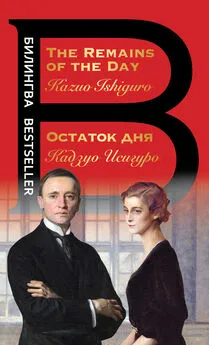


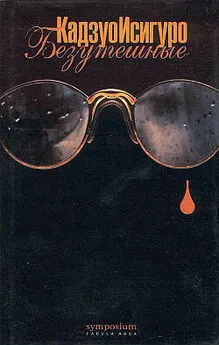
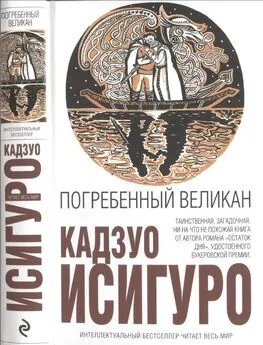
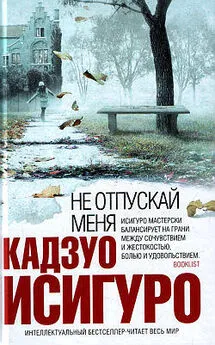
![Кадзуо Исигуро - Не отпускай меня [litres]](/books/1095846/kadzuo-isiguro-ne-otpuskaj-menya-litres.webp)
